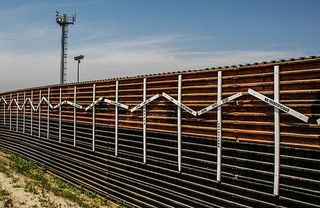Trust
Does Diversity Make Us Unhappy?
The Wall will not make Americans happy, but other things will.
Posted March 27, 2019

This guest post was written by Maryann Kwakwa and Andrea Peña-Vasquez. Both are doctoral candidates in Political Science at the University of Notre Dame. It is based on their recent paper in the peer-reviewed journal Politics, Groups, and Identities.
Some believe that immigration is to blame for the nation’s social and economic ills. The president has applied this logic through a series of morally dubious public policies, such as the Travel Ban, the "zero tolerance" family separation policy, and, of course, the Wall.
Will anti-immigrant policies aimed at creating a more homogenous society succeed in improving quality of life in the United States? Will America be happier if it is less diverse?
Although Americans are feeling anxious, depressed, and dissatisfied with their lives more than ever before, directing this angst toward immigrants is misguided. The evidence from other countries clearly suggests that conclusion: Other advanced industrial democracies have larger and more consistent influxes of immigrants than the US, but their aggregate levels of subjective well-being (SWB)—or life satisfaction—are much higher than that of the United States. In our recent article in the peer-reviewed journal Politics, Groups, and Identities, we assess the extent to which ethnic, religious, and linguistic fractionalization (i.e., diversity) negatively affects levels of SWB. According to our research, less diversity will not make us happier. Whether a physical structure or just a metaphor for animus against immigrants, building the Wall will not increase SWB amongst Americans. However, we find evidence of something that will increase the extent to which people find life to be a positive and rewarding experience: making our social safety net more universalistic and generous.
Fractionalization (the probability that two randomly chosen individuals from a country will be from different groups) is often used as a measure of diversity. Theoretically, there are two reasons why increasing levels of racial, linguistic, or religious diversity might decrease levels of SWB within a country. First, fractionalization can decrease trust amongst citizens. The type of trust needed to promote consensus and compromise within public institutions is "generalized trust"—the belief that most people can be trusted. Unfortunately, fractionalization tends to increase the belief that people can only trust members of their in-group (i.e., particularized trust). Second, fractionalization exacerbates conflictual behavior. This not only leads to inefficient transactions between groups but in extreme cases can lead to civil war or worse. By decreasing trust and increasing conflict, fractionalization may thus undermine levels of SWB in the short run. At the same time, though, scholars find that there are numerous societal benefits to diversity, which might more than account for diversity's (possible) negative pressure on life satisfaction. Studies show that fractionalization can affect countries negatively. But some countries have institutions that allow them to minimize or absorb the costs of diversity, such that in the long run, they may enjoy diversity's benefits.
We argue that the size of a country’s "welfare state" is one such institution, serving as it does to mollify the potential problems diversity (might) bring. In his book, The Political Economy of Happiness, and in a large number of peer-reviewed journal articles, Professor Benjamin Radcliff shows that institutions like the social safety net, labor unions, and pro-worker economic regulations (such as the minimum wage) make the world a better place by protecting people against the moral indifference of the market economy. As he argues, it is certainly true that "the market economy is one of humanity's greatest achievements," but at the same time, we as a society have to add a central ingredient missing from the cold efficiency of the market: justice. That, in turn, is created politically, through the institutions mentioned above—the safety net, labor unions, and economic regulations that protect workers and citizens—which can be shown to work to the benefit of everyone, rich and poor alike.
Without digressing into the weeds of detail, these New Deal policies are best thought of as producing what economists call "decommodification." This process has the potential to enhance individual capacities and capabilities, promote social cooperation and collaboration, reduce in- and out-group conflict, deepen social solidarity, and improve the social capacity for collective decision-making. (See “Decommodification and Egalitarian Political Economy” in the peer-reviewed journal Politics and Society (2010).) Put differently, policies like safety net help reduce conflict that might otherwise present itself by reducing the number of families facing economic desperation. Desperate people who cannot make ends meet, people who worry about their children going to bed hungry. They may be more prone than others to promote in- and out-group conflict. Reduce economic anxiety and you reduce the pressures that encourage anti-social behaviors.
We thus hypothesize that the effect of ethnic fractionalization on SWB depends on the size of the social safety net, such that the larger and more generous ("decommodifying") public protections become, the smaller will be any possible negative effects of ethnic heterogeneity. Pooling almost a decade of data from the World Values Survey, we analyze the effect of diversity (as measured by ethnic, linguistic, and religious fractionalization) on SWB (i.e., self-reported levels of happiness) within 23 industrial democracies. To measure the size of each country’s safety net, we use the decommodification index created by Professor Lyle Scruggs at the University of Connecticut.
Even after we account for unemployment, economic growth, country wealth, and culture, we find that decommodification (i.e., the expansiveness and generosity of the social safety net) remains a significant predictor of national happiness in countries where there is significant ethnic and linguistic fractionalization. The statistical results clearly point toward decommodification as the critical factor affecting happiness—it more than accounts for the costs of diversity.
Our findings not only suggest that a more expansive safety net will quell anger and anxieties about immigration, but they also imply that a stronger "welfare state" will increase the benefits associated with a more diverse population. We hope that our findings will inspire readers to learn more about the effects of social democracy—as in Finland, rated the happiest country in the world by the UN in its 2019 World Happiness Report.


